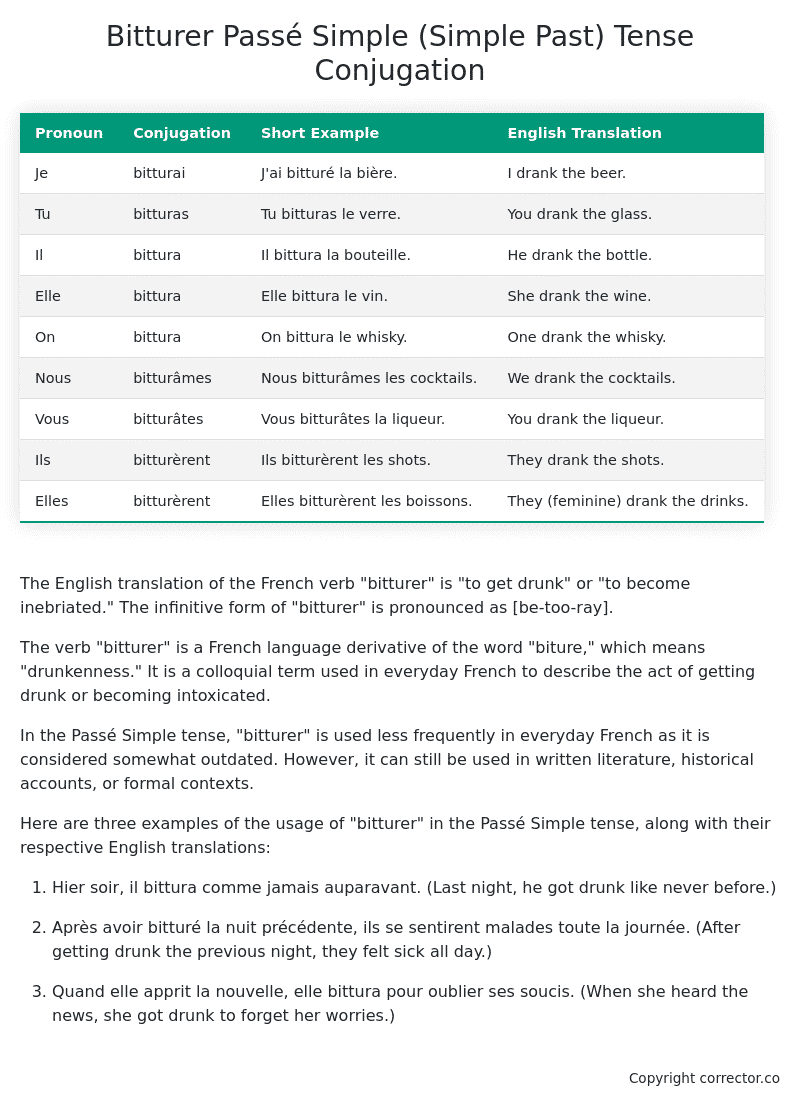Passé Simple (Simple Past) Tense Conjugation of the French Verb bitturer
Introduction to the verb bitturer
The English translation of the French verb “bitturer” is “to get drunk” or “to become inebriated.” The infinitive form of “bitturer” is pronounced as [be-too-ray].
The verb “bitturer” is a French language derivative of the word “biture,” which means “drunkenness.” It is a colloquial term used in everyday French to describe the act of getting drunk or becoming intoxicated.
In the Passé Simple tense, “bitturer” is used less frequently in everyday French as it is considered somewhat outdated. However, it can still be used in written literature, historical accounts, or formal contexts.
Here are three examples of the usage of “bitturer” in the Passé Simple tense, along with their respective English translations:
-
Hier soir, il bittura comme jamais auparavant.
(Last night, he got drunk like never before.) -
Après avoir bitturé la nuit précédente, ils se sentirent malades toute la journée.
(After getting drunk the previous night, they felt sick all day.) -
Quand elle apprit la nouvelle, elle bittura pour oublier ses soucis.
(When she heard the news, she got drunk to forget her worries.)
Table of the Passé Simple (Simple Past) Tense Conjugation of bitturer
| Pronoun | Conjugation | Short Example | English Translation |
|---|---|---|---|
| Je | bitturai | J’ai bitturé la bière. | I drank the beer. |
| Tu | bitturas | Tu bitturas le verre. | You drank the glass. |
| Il | bittura | Il bittura la bouteille. | He drank the bottle. |
| Elle | bittura | Elle bittura le vin. | She drank the wine. |
| On | bittura | On bittura le whisky. | One drank the whisky. |
| Nous | bitturâmes | Nous bitturâmes les cocktails. | We drank the cocktails. |
| Vous | bitturâtes | Vous bitturâtes la liqueur. | You drank the liqueur. |
| Ils | bitturèrent | Ils bitturèrent les shots. | They drank the shots. |
| Elles | bitturèrent | Elles bitturèrent les boissons. | They (feminine) drank the drinks. |
Other Conjugations for Bitturer.
Le Present (Present Tense) Conjugation of the French Verb bitturer
Imparfait (Imperfect) Tense Conjugation of the French Verb bitturer
Passé Simple (Simple Past) Tense Conjugation of the French Verb bitturer (You’re reading it right now!)
Passé Composé (Present Perfect) Tense Conjugation of the French Verb bitturer
Futur Simple (Simple Future) Tense Conjugation of the French Verb bitturer
Futur Proche (Near Future) Tense Conjugation of the French Verb bitturer
Plus-que-parfait (Pluperfect) Tense Conjugation of the French Verb bitturer
Passé Antérieur (Past Anterior) Tense Conjugation of the French Verb bitturer
Futur Antérieur (Future Anterior) Tense Conjugation of the French Verb bitturer
Subjonctif Présent (Subjunctive Present) Tense Conjugation of the French Verb bitturer
Subjonctif Passé (Subjunctive Past) Tense Conjugation of the French Verb bitturer
Subjonctif Imparfait (Subjunctive Imperfect) Tense Conjugation of the French Verb bitturer
Subjonctif Plus-que-parfait (Subjunctive Pluperfect) Tense Conjugation of the French Verb bitturer
Conditionnel Présent (Conditional Present) Tense Conjugation of the French Verb bitturer
Conditionnel Passé (Conditional Past) Tense Conjugation of the French Verb bitturer
Conditionnel Passé II (Conditional Past II) Tense Conjugation of the French Verb bitturer
L’impératif Présent (Imperative Present) Tense Conjugation of the French Verb bitturer
L’impératif Passé (Imperative Past) Tense Conjugation of the French Verb bitturer
L’infinitif Présent (Infinitive Present) Tense Conjugation of the French Verb bitturer
L’infinitif Passé (Infinitive Past) Tense Conjugation of the French Verb bitturer
Le Participe Présent (Present Participle) Tense Conjugation of the French Verb bitturer
Le Participe Passé (Past Participle) Tense Conjugation of the French Verb bitturer
Struggling with French verbs or the language in general? Why not use our free French Grammar Checker – no registration required!
Get a FREE Download Study Sheet of this Conjugation 🔥
Simply right click the image below, click “save image” and get your free reference for the bitturer Passé Simple tense conjugation!

Bitturer – About the French Passé Simple (Simple Past) Tense
Formation
Usage
Narration
Historical Context
Interactions with other tenses
Passé Composé
Imparfait
Conditional and Subjunctive
Summary
I hope you enjoyed this article on the verb bitturer. Still in a learning mood? Check out another TOTALLY random French verb conjugation!


